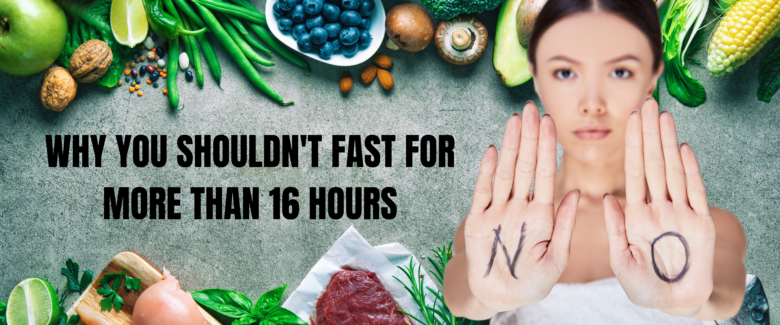Intermittent Fasting is all the rage. For good reason!
Intermittent Fasting is when you eat your meals in a smaller window of time. Typically in 12 hours or less.
Many use it to help maintain a healthy weight.
Fasting can allow time for your digestive system to do it’s job and when it is done digesting your food it can clean up bacteria, viruses, inflammation and rogue cells.
Sounds pretty awesome, right?!
It can be, but it has a downside.
If you are a woman between 40 and 60 years of age you may notice that prolonged fasting doesn’t give you the same results that it does for men.
In fact, instead of revving up your metabolism and losing those stubborn pounds, women may find a 50% increase in cortisol (your fight or flight hormone) and a decrease in insulin sensitivity. Cortisol increases the storage of belly fat and insulin resistance leads to diabetes, heart disease and dementia. No, thank you!
It has a lot to do with hormone balance. As women age they have less estrogen.
Less estrogen means less resilience and a harder time coping with stress and trauma making women more prone to anxiety and mood disorders at this time.
With less resources to deal with stress, cortisol goes up.
When you fast, your primal brain, which is only concerned with your survival, senses a famine is happening and will panic thinking you are going to die of hunger.
Not only will this cause a rise in cortisol, which increases belly fat but your primal brain will hijack your evolved brain and have you reach for the nearest and quickest fuel source, usually sugar and other carbs.
This happens when you skip meals too.
Doris came to see me when she was struggling with fatigue, brain fog and stubborn weight gain. Despite her best efforts of intermittent fasting for 18 hours, she was still struggling.
I had her follow The Supercharged Method, the program from my book The Supercharged Method: Your Transformation from Fatigued to Energized.
She continued to intermittent fast but for not more than 14 hours by eating her last meal 3 hours before bed and eating her first meal when she was legitimately hungry the next day. She quickly saw results.
Just like a gardener who over fertilizes their plants, intermittent fasting for women between 40-60 years of age is only good in the right amount.
Takeaways:
#1. Eat a protein and 2 veggies, every 3-4 hours in a 12 hour time period.
#2. Intermittent fast from the time of your last meal, (hint: 3 hours before bed) until you are legitimately hungry the next day. Should be 12 – 16 hours.
#3. Do not fast longer than 16 hours.
If you follow these tips, you will be feeding your brain the fuel it needs… fuel to nurture and sustain your brain and body. You’ll have more energy, and when you’re feeding yourself in this way the extra protein will help to boost your metabolism and stabilize your hormones.
If you have been intermittent fasting and wondering why it’s not working, make an appointment with me to help you figure out what will work for you.



I’ve been doing intermittent since long without any result …I think I’m doing the wrong thing .
I live in Bombay..India..Please advice and help .
Thank you .
Very informative
Find a functional medicine doctor in your area. Good luck.